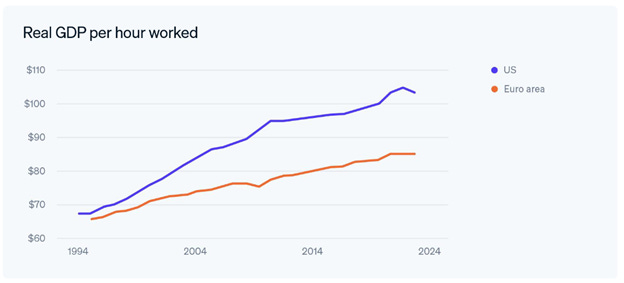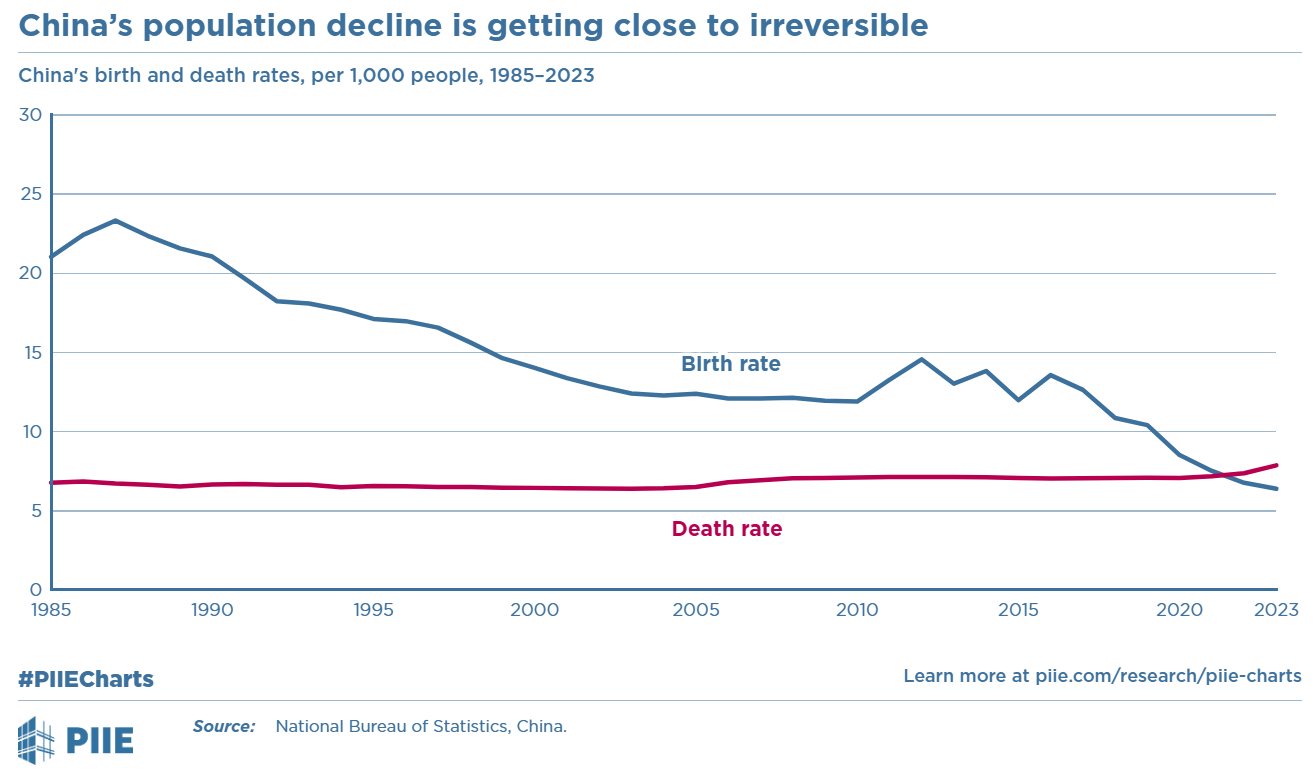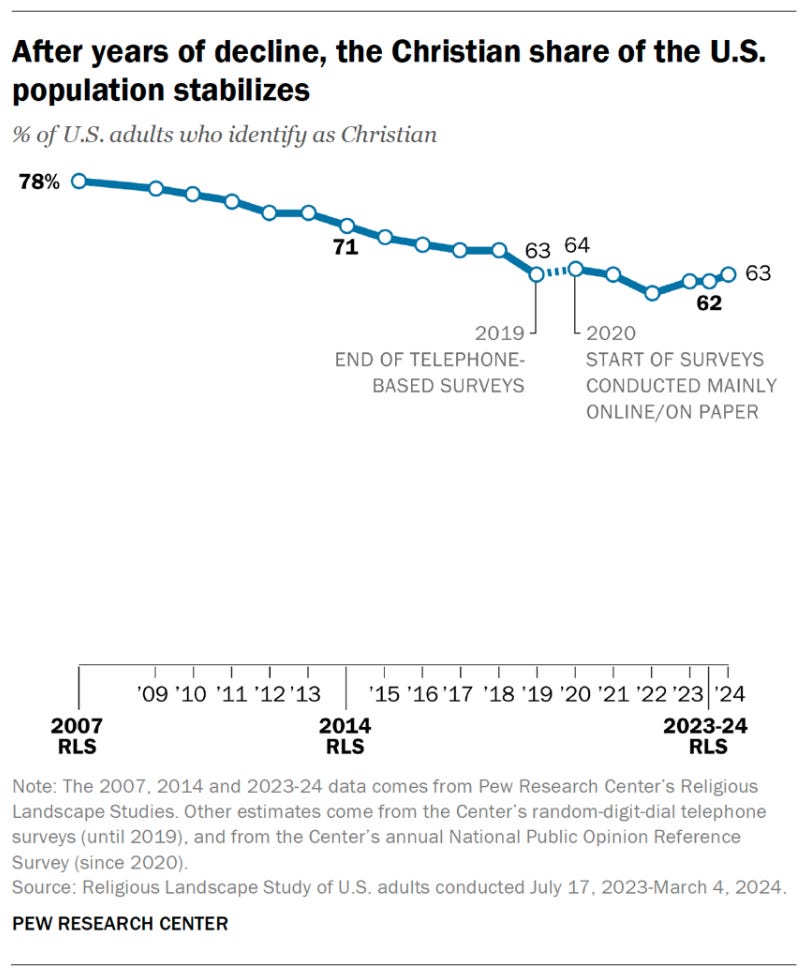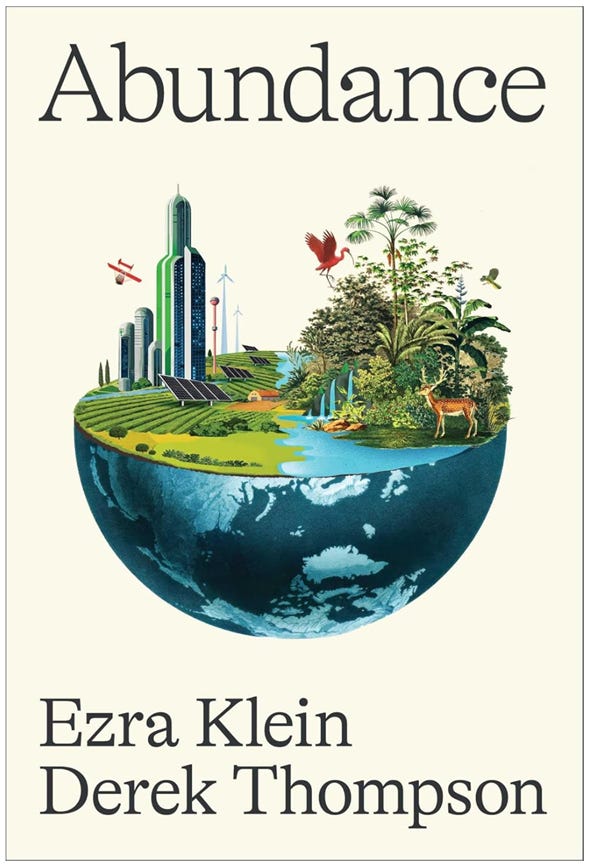Worth Considering
Some of what I have read recently
Articles, essays, and research I have read recently that make points worth considering.
Apple is 3-5 years behind competitors in AI
Gurman, Mark. 2025. "Apple’s Artificial Intelligence Efforts Reach a Make-or-Break Point." Bloomberg, March 2, 2025.
Apple Intelligence show alarmingly low adoption rates, with internal data indicating a <15% adoption rate for Apple Intelligence among eligible iPhone 15/16 users since their October 2024 rollout. Siri's modernization lags 3-5 years behind competitors, with conversational capabilities delayed until 2027 (iOS 20). Workforce issues include a 22% annual attrition rate in AI engineering roles (2024 company data) and leadership concerns about John Giannandrea's team effectiveness.
Payments on Stripe equaled 1.3% of global GDP in 2024, Europe’s growth suffers due to access to capital and regulatory complexity
Stripe's 2024 Annual Letter. 2025. Stripe.
In 2024, Stripe processed $1.4 trillion in payments, up 38% year over year and equivalent to 1.3% of global GDP. In the letter Stripe attributes a 2.5% annual productivity gap between US ($104/hour) and Europe ($85/hour), to capital access disparities (32% EU vs 80% US non-bank corporate lending) and regulatory complexity. Stripe points out that complexity slows innovation and entrepreneurship in Europe. “We don’t think that anyone in Europe deliberately made it a policy goal to discourage the creation or success of new firms, but this has been the inadvertent result.”
China’s population decline will have severe consequences
Kirkegaard, Jacob Funk. 2024. "China's population decline is getting close to irreversible." Peterson Institute for International Economics.
China’s natural population declined by 2.08 million in 2023 (9.02 million births vs 11.1 million deaths), continuing a 50% birth rate collapse since 2016. With an official fertility rate of 1.09 in 2022, China’s population cohorts are being virtually halved every generation. Major Chinese cities like Beijing and Shanghai already have TFRs at or below 1.0, mirroring low-fertility East Asian peers Hong Kong, Taiwan, and Singapore. Long-term economic implications include shrinking consumer bases, housing market instability, and a diminished prospect of ever surpassing US GDP.
Ambiguity tolerance, risk approach, and conscientiousness, play a more significant role than intelligence management promotions
Cuppello, Stephen, Luke Treglown, and Adrian Furnham. 2024. Intelligence, Personality, and Management Level. Consulting Psychology Journal.
Personality traits, particularly ambiguity tolerance, risk approach, and conscientiousness, play a more significant role than intelligence in determining management level, though age and gender also contribute to leadership attainment. Age accounted for 11.4% of variance in management level, while intelligence explained only 0.5% incremental variance beyond demographics. Personality traits added 4.5% incremental predictive power over intelligence, with ambiguity tolerance, risk approach, and conscientiousness showing strongest correlations.
Attractive female restaurant servers earn higher tips due to female customers
Parrett, Matt. 2015. Beauty and the Feast: Examining the Effect of Beauty on Earnings Using Restaurant Tipping Data. Journal of Economic Psychology.
Attractive servers earn approximately $1261 more annually in tips than unattractive servers, translating to about 1.37 percentage points higher in tip percentages and $0.40 more per transaction in absolute terms. Female customers tipped attractive female servers 3.01 percentage points more on average. Male customers showed no significant differences in tipping behavior toward attractive versus unattractive female servers. Attractive servers benefit from a "beauty premium" when they meet customer expectations for high-quality service but face a "beauty penalty" when those expectations are unmet.
The decades-long decline in American religiosity has paused
Graham, Ruth. 2025. "Christianity’s Decline in U.S. Appears to Have Halted, Major Study Shows." The New York Times, February 26, 2025.
Christianity comprises 62% of U.S. adults (40% Protestant, 19% Catholic), down from 90% in the early 1990s but stable since 2020. Religiously unaffiliated Americans plateaued at 30%, halting a decades-long growth trend. Young adults born 2000–2006 show no further religious decline compared to 1990s-born cohorts. Political polarization dominates religious trends: 34% of liberals identify as Christian (down 25 points since 2007), while 82% of conservatives do (down 7 points). 80% of Americans believe in a soul/spirit and God/universal spirit, indicating persistent spirituality despite institutional religious declines.
Klein and Thompson argue for a new Democratic party agenda focused on abundance and effective governance, rather than resisting adversaries
Klein, Ezra, and Derek Thompson. 2025. “There Is a Liberal Answer to the Trump-Musk Wrecking Ball.” The New York Times, March 9, 2025.
Democrats face a critical political and existential challenge. Their failure to provide effective governance on key issues, particularly the affordability crisis, has led to significant voter distrust and migration away from Democratic strongholds. Despite winning the 2020 presidential election, rising living costs contributed to Trump’s victory in 2024, indicating a lack of voter trust in Democrats to manage the economy. California, Illinois, and New York collectively lost over 540,000 residents in 2023, primarily due to high living costs and perceived inadequacies in affordable housing, child care, and commuting options. California's high-speed rail project illustrates the failure to build housing and infrastructure, which ballooned in estimated cost from $33.6 billion in 2009 to $110 billion today, with only partial Central Valley construction completed despite 12 years of environmental reviews. (I recently wrote about California high-speed rail in “Beyond Woodstock: How Economic Shifts Redefined America’s Infrastructure Priorities.”) They propose countering scarcity narratives common from both parties with “abundance politics” prioritizing deregulation for housing construction, streamlined clean energy projects, and rebuilding public trust through visible governance successes. This essay is adapted from their forthcoming book “Abundance,” by Ezra Klein and Derek Thompson which will be published March 18, 2025.
Peace through understanding.







